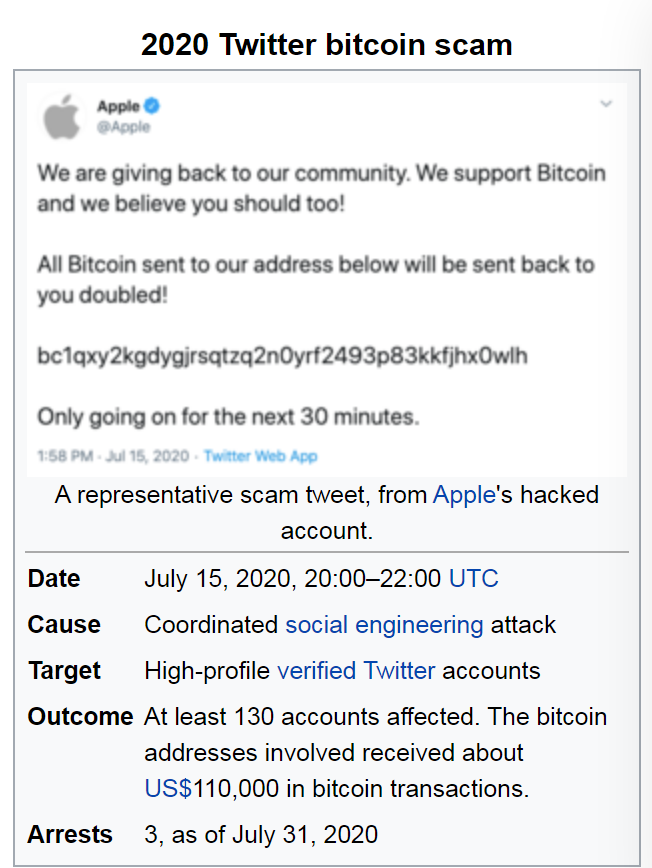Check out our new platform 🚀 https://thecapital.io/
You might be a newbie who has just entered the realm of cryptocurrency, or an investor who wants to know about digital currencies, or an enthusiast who wants to know about new innovations.
The sophisticated methods used to steal one’s information or assets are scams, and in a crypto environment, they are more subtle.
But this article will show you all the things you need to know to protect your digital coins.
Let’s dive in:
Scams via social media posts
Similar to the iPhone and fiat currencies (Government-issued currencies such as Dollar and Rupee) giveaways, there are also some posts showing cryptocurrency giveaways.
To attract a mass of credulous people, some entrepreneurs and famous people in the field of cryptocurrencies are used as a magnet.
Here is one of these magnets:
On July 25, 2020, $110,000 have been stolen using high-profile Twitter accounts as scam propagators.
According to the inquiry report, three employees of Twitter were involved in granting access to hackers to use high-profile accounts for scam.
One of the scam tweets from Apple hijacked account is here:

To avoid such scams, keep the following weapons in your armory:
‘’Send us x BTC and we will send you 2x BTC,’’ is one of the most prominent sentence use in such scams.
Next time don’t believe in such claims of having some magical wand to double your money, even if such claims come from big guns accounts.
Second, users of some sites such as Blockchain.com are asked to provide a password or 12-word recovery phrase on social media by hackers.
These sites use their user support platform for activities related to user account information. So don’t provide such information on social media.
If you see some suspicious activities on authentic social media accounts, immediately report it on social media platforms.
Now you are immune to social media scams, let’s dive in to have the next level of resistance.
Scams on the name of Technical support
Your phone rings, someone is calling you. You hit the green button, and there comes a voice,’’ Hello, I am from Coinbase, and we need some personal information.’’ Your reply is,’’ Why not? Here is my information. Hope you don’t have any problem.’’ The answer comes,’’ No, no. Have a nice day (fool day)! Goodbye.’’
This is one of the old-school methods that are still used to make people fool.
Many of us even fall prey to them.
Here is your shield against them:
No company representative calls you and asks you to give personal information of your account.
So provide no secret information to any person on a phone call even you feel he is 99.9% real.
Imposter websites
One of the most subtle scams in the crypto universe is using fake websites. Such websites have a similar look and feel to the original websites, but it is not impossible to identify them.
The first and foremost thing to remember is that rather than directly going to the website name, it is better to search for it in the search box.
The reason is that if you miss (a single letter), the scammer will hit, and you will be directed to an imposter website having a similar look to the original website.
A Reddit user named castorfromtheva, just for the sake of test, typed ‘’tezor.io’’ (Trezor is a hardware wallet for bitcoin and other cryptocurrencies) instead of tying real website name ‘’trezor.io’’ and he was directed to a fake website.
‘’Bookmarking’’ is an indestructible shield against such attacks. Bookmark the original website, and the job is done.
Now comes the fake apps:
Fake mobile apps
Fake mobile applications are used by the scammers to steal coins and other credentials, such as mobile numbers and email addresses for phishing.
Google and Apple play stores try their best to keep fraudulent material out, but they are still vulnerable.
‘’Poloniex,’’ ‘’Trazer Wallet app’’ and “Coin Wallet — Bitcoin, Ripple, Ethereum, Tether’’ are three of them.

They have been removed from the online app stores.
Following are some ways to ensure your protection:
- Only download cryptocurrency-related apps that are linked from the authorized sites.
- Always keep your operating system updated.
- Don’t trust apps from third parties.
Fake emails
Usually, in the cryptocurrency environment, scammers under the disguise of well-known sites send emails containing links to imposter websites that look similar to the real ones.
Cryptocurrency transactions are irreversible. Here is a fake email:

Surveys are another way to get people’s sensitive information. Beware of them;

Following are the ways to prevent such scams:
- Ensure that the links direct you to a legitimate site.
- It is better to search in Google rather than clicking on the link.
- Don’t download attachments from the third party sites.
Conclusion
‘’With great power, comes the great responsibility.’’
As all cryptocurrencies are digital, risks are more sophisticated.
But we can still keep ourselves safe.
Always keep your eyes open and never show laziness as your money is at stake.
You might know some other solutions, show us your thoughts in the comment box.
Don’t forget to share this highly useful and required information.
https://twitter.com/thecapital_io
A Definitive Guide To Major Cryptocurrency Scams (You must know) was originally published in The Capital on Medium, where people are continuing the conversation by highlighting and responding to this story.
from The Capital - Medium https://ift.tt/2HF6KmQ
0 Comments